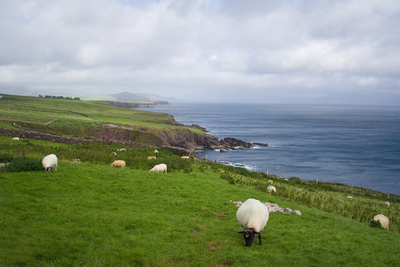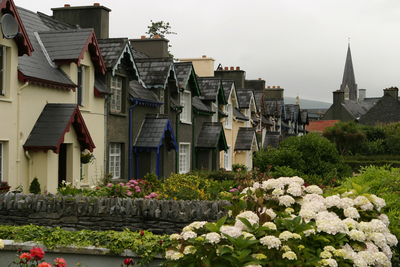The Irish Issue
 Does gun registration lead to gun confiscation? In Ireland, like most other places it has been tried, the answer is “yes.” Ireland’s handgun owners defeated prohibition once before, an
Does gun registration lead to gun confiscation? In Ireland, like most other places it has been tried, the answer is “yes.” Ireland’s handgun owners defeated prohibition once before, an
In a nation of 4 million people, Ireland has only 230,000 licensed guns, including air guns and paintball guns. There are only about 1,800 licensed handguns. Gun misuse by these people is almost nonexistent.
In the United States, you can declare that it is your constitutional right to bear arms. But in the UK, you need to spend hours filling in paperwork and proving to police officers that you are not a danger to society.
The system is administered by police forces in each part of the UK and in England, Scotland and Wales there are separate licences for shotguns and for other firearms.
Infringements on the rights of the Irish can be traced back to the centuries of rule of Ireland by Great Britain. For eight centuries the Irish people never consented to English rule, and they repeatedly attempted to regain their independence by force of arms.
Beginning in the late 17th century, the rule of the British, and of those Irish Protestants who allied with the British, was consolidated by the “Laws in Ireland for the Suppression of Popery,” which were commonly called the “Penal Laws.” A 1695 statute, titled “An Act for the better securing the government, by disarming papists,” forbade arms and ammunition possession by Catholics.
Prohibited from owning or carrying firearms or edged weapons, many Irish Catholics began carrying shillelaghs, walking sticks well suited for use as clubs.
During the 19th century, many of the formal legal discriminations against Catholics were removed. Early in that century, the arms ban for Catholics was replaced with a requirement that the possession of firearms and swords were illegal for everyone in Ireland, unless the person was issued a license and identity of the particular sword or firearm was registered at the person’s local town hall and also listed on the license document. The system allowed firearm possession only by persons considered politically reliable.
At this time, the Irish were fighting for independence in the 1919-1921 Anglo-Irish War. This time, they prevailed. Pursuant to the Anglo-Irish Treaty, Ireland became a self-governing dominion of the British Empire (similar to Canada). Later, Ireland withdrew entirely from its political association with Great Britain.
Under the treaty, six counties in Northern Ireland, which has a majority Protestant population, were allowed to vote on whether to become part of the new Republic of Ireland, or to remain part of the United Kingdom. The six counties chose to stay with the U.K. Although Ireland’s legislature narrowly voted to approve the peace treaty, some hard-line elements in Ireland were so upset about the six counties that they commenced a civil war against the new government. The Irish Civil War lasted nearly a year, with the insurrection finally suppressed in May 1923.
Because of the affects of the Civil War, the gun laws of the new Republic retained many of the worst features of the old laws that the British had imposed. The Firearms Act, 1925 declared that no one can possess a firearm unless one has been issued a firearm certificate, and a certificate will only be issued if the police believe that the applicant has a “good reason.”
The government’s definition of “firearm” is as broad as any in the world, covering any device with muzzle energy greater than one joule (0.74 foot-pounds). This includes every air gun as well as paintball guns. In the United States, only New Jersey rivals this ridiculous definition. The Irish law was even more repressive than its 1920 British counterpart, which at the time did not apply to shotguns and air guns.
During the late 1960s, a terrorist organization calling itself the Provisional Irish Republican Army launched a campaign against Northern Ireland, and also carried out attacks on the island of Great Britain. PIRA allied itself with international terrorist organizations of the extreme left and received support from tyrants such as Libya’s Moammar Qaddafi. PIRA also had supporters in the United States and in the Republic of Ireland.
While PIRA’s international terrorist connections helped provide it with guns, PIRA also armed itself by stealing guns in the Republic of Ireland, especially from farmhouses in counties that bordered Northern Ireland.
1972 Temporary Custody Order and Pistols in Irish firearms law
One of the most controversial events in the history of the Firearms Acts occurred in 1972. The "Troubles" in Northern Ireland (1970–1998) were becoming a security concern for the Irish Government at the time, and in 1972 a Temporary Custody Order (S.I. No. 187/1972 – Firearms (Temporary Custody) Order, 1972) was issued for all privately held pistols and all rifles over .22 calibre to be surrendered to local Garda (police) stations by 5 August 1972, for a period of one month. This order was complied with, but when firearms owners returned to reclaim their firearms, they were informed that their licenses had expired while their firearms were in custody (Irish firearms licenses until 2008 were issued for a period of one year, and all licenses were usually dealt with at the same time, usually at the start of August, though the date has changed over the years). Since the firearms were no longer licensed, they could not be returned until a new license was issued; upon seeking a renewal of their licenses, applicants were informed that a new Garda policy was in place that would refuse license applications for all pistols and all firearms over .22 in calibre. As such, the firearms in Garda custody remained in Garda custody.
This situation continued until the late 1990s, when fullbore rifles of calibres up to .270 Winchester were permitted to be licensed for the purposes of deer hunting on humane grounds (prior to this, only the .22–250 cartridge was available for deer hunting and it was felt to be only barely capable of this task). All other firearms held in custody remained there, until the repeal of the Garda policy following a high court case taken by an Irish shooter (Frank Brophy) to obtain a license for an Olympic target shooting pistol succeeded and the license was granted. Following this, firearms held in storage by the Gardai were reclaimed by those owners still alive or their descendants. As these pistols were never formally confiscated (and some were sold off by their owners and removed from Garda custody in that manner), no compensation was claimable by the owners.
Modern Day Gun Control

In 2004 a major change occurred when Frank Brophy won a case to licence a .22lr single-shot Toz-35 target pistol. This judgement led to the Gardai dropping their no-licence policy for the first time since 1972. In the years after, many more pistols were licenced, and the sport of pistol target shooting sprang back to life.
Firearm certificates are not issued for self-defense, but for sporting purposes. Handgun hunting is not allowed but target shooters were able to obtain handgun certificates.
Hope for Sportsmen
Following the Brophy case, some 300 pistols were licensed in Ireland, ranging from new Olympic air pistols (which are firearms under Irish law) to reclaimed pre-1972 pistols to new centerfire pistols. While welcomed by the target shooting community, in 2008 opposition deputies Jim Deasy and Olivia Mitchell campaigned to ban these pistols on the grounds that they could be used in crime. Ireland’s Justice Minister Dermot Ahern announced a ban on all handguns in November 2008.
This ban was fought by the various governing bodies of shooting sports in Ireland, with the end result as of 2011 that air and smallbore pistols may still be licensed in Ireland, but all centerfire pistols not licensed prior to 17 November 2008 cannot be licensed.
One of the effects of a repressive system of gun licensing in both the Republic of Ireland and in the United Kingdom is to gradually diminish the number of people who own guns and participate in the shooting sports. When you put up bureaucratic barriers to a sport, you will succeed in discouraging some people from trying or continuing that sport
So after centuries of gun restrictions in Ireland, gun owners are a small percentage of the population,
Current Conditions
In 16 out of 28 police districts, the chief superintendent of the force (who is a political appointee) has issued orders to refuse all certificate renewal applications for centerfire handguns. Nationally, about 80 percent of handgun certificate renewals have been denied. Expressing a typical attitude, Chief Superintendent John Kerin, of Kerry, said that centerfire handguns “are to kill people and to defend people,” and thus, “there should be no guns of this type in the hands of civilians. I don’t believe target shooting is a good and sufficient reason.”
Even members of the International Police Association Pistol Club (composed of current and retired law enforcement officers) were denied certificate renewals and were unable to compete last summer in the European Police and Fire Games in Valencia, Spain.
Under the law enacted by the police, application denials can be appealed to a district court, and so far more than 80 percent of these appeals have succeeded. In Ireland, a district court is a low-level court that hears licensing cases of all sorts. Because district court decisions cannot be cited as precedents, a district court decision in favor of one individual’s certificate application does nothing to require that the superintendent obey the law in regard to other applicants.
Bleak as the situation is for handgun owners in Ireland, there has been some progress on civil rights in recent years. America’s 1st Freedom has covered the case of Tony Martin, the British man who was sent to prison because he shot a burglar. Public outcry in England led to reforms in English self-defense laws, broadening the conditions under which use of force is allowed.
A similar case transpired in Ireland. After Pádraig Nally, an elderly farmer in County Mayo, shot and killed a burglar, Nally was convicted of manslaughter and sentenced to 11 years in prison. The burglar, John Ward, had a long criminal record and a history of violence; at the time of burglary, he was out on bail for a knife attack he had recently perpetrated. Nally’s conviction was appealed to the Supreme Court, where his attorney argued that a person in fear of his own life should be able to use whatever force is needed to save himself. The Supreme Court ruled in his favor, and Nally was released from prison, having served 10 months.
In response, the legislature passed a self-defense reform that took effect in December 2010. The Home Defense Bill specifies that victims of home invasion can use “reasonable” force in defense of themselves and their homes. Depending on the particular circumstances, deadly force can be considered “reasonable.” In the home, there is no longer a requirement that a crime victim must retreat rather than use force.
The reform was supported by the Association of Garda Sergeants and Inspectors, and by Rural Link, a network of rural community organizations.
Even so, using a firearm for self-defense will not be easy. The certificates issued for pistols and for some rifles state that the gun can only be used at a certified range. So a handgun or rifle owner might not be prosecuted for shooting the violent intruder, but the owner could still be prosecuted for using the gun in violation of the certificate terms. Shotguns, which constitute more than three-quarters of the Irish gun supply, do not have range-only restrictions on their certificates.